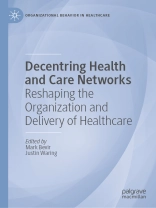Networks have become a prominent template for public service governance. Often seen as an alternative to hierarchies and contracts, networks cross institutionalized organizational or sectoral boundaries to promote collaboration and the sharing of resources when addressing complex problems. Nowhere is this more the case than in the field of health services modernization and improvement.
Comprising unique empirical contributions, drawn primarily from the experience of the UK National Health Service (NHS), this edited collection develops a ‘decentred’ analysis of health and care networks. Contributors look beyond particular structures or patterns of governance and focus instead on the interpretation of the meaningful practices of policy actors as they encounter and enact policy instruments and structures. The approach offers a distinct form of analysis that deepens and enriches more traditional public policy accounts of network governance. It recognizes the influence of local history, highlights the influence of dominant economic, technical and corporate narratives, and acknowledges the continued influence of biomedical knowledge and professional expertise.
Offering practical insight for current and future service leaders about the challenges of implementing, managing and working within networks, this book draws out key messages for practitioners and researchers alike.
Daftar Isi
Chapter 1: Decentring networks and networking in health and care services.- Chapter 2: The contested practice of networking in healthcare management.- Chapter 3: Analysing the micro implementation of health care reforms: a decentred approach.- Chapter 4. Buddies and Mergers: decentring the performance of healthcare provider partnerships.- Chapter 5. Space and place in network governance: putting integrated care into place.- Chapter 6: Situating practices of human and non-human networks in the delivery of emergency and urgent care services .- Chapter 7: Sharing stories or co-constructing practice? Challenges to undertaking and researching innovation using evidence from the English NHS.- Chapter 8: Networking for health, networking for wealth: A study of English health innovation policy in practice.- Chapter 9. Tensions between technocracy, scientific knowledge and co-production in collaborative health and care networks.- Chapter 10. Is co-production just really good PPI? Making sense ofpatient and public involvement and co-production networks.- Chapter 11: Professional Pastoral Work in a Kenyan Clinical Network: Transposing Transnational Evidence-based Governmentality.
Tentang Penulis
Mark Bevir is Professor at the Department of Political Science and Director of the Center for British Studies at the University of California, Berkeley, USA. He is also a Professor at the Graduate School of Governance, United Nations University – MERIT, Maastricht, the Netherlands. He has published widely on public policy and governance.
Justin Waring is Professor of Medical Sociology and Healthcare Organisation and Deputy Director of the Health Services Management Centre, University of Birmingham. His research deals with the changing organization and governance of public services, with a particular focus on the governance of healthcare professional work.












